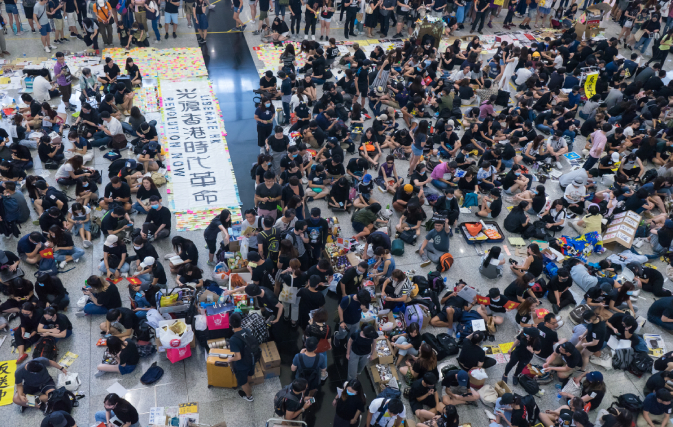HONG KONG — Chaos has broken out at Hong Kong’s airport as riot police move into the terminal to confront protesters who shut down operations at the busy transport hub for two straight days.
Officers armed with pepper spray and swinging batons clashed with protesters who used luggage carts to barricade entrances to the airport terminal on Tuesday night.
Police took several people into a police van waiting at the entrance to the airport’s arrivals hall.
Protesters have severely crippled operations at Hong Kong’s international airport for a second day Tuesday, forcing authorities to cancel all remaining flights out of the city after demonstrators took over the terminals as part of their push for democratic reforms.
After a brief respite early Tuesday during which flights were able to take off and land, the airport authority announced check-in services for departing flights were suspended as of 4:30 p.m. Departing flights that had completed the process would continue to operate.
It said it did not expect arriving flights to be affected, though dozens were already cancelled. The authority advised people not to come to the airport, one of the world’s busiest transport hubs.
On Monday, more than 200 flights were cancelled and the airport was effectively shut down with no flights taking off or landing.
Passengers have been forced to seek accommodation in the city while airlines struggle to find other ways to get them to their destinations.
The airport disruptions are an escalation of a summer of demonstrations aimed at what many Hong Kong residents see as an increasing erosion of the freedoms they were promised in 1997 when Communist Party-ruled mainland China took over what had been a British colony.
Those doubts are fueling the protests, which build on a previous opposition movement that shut down much of the city for seven weeks in 2014. That movement eventually fizzled out and its leaders have been jailed on public disturbance charges.
The central government in Beijing has ominously characterized the current protest movement as something approaching “terrorism” that poses an “existential threat” to the local citizenry.
While Beijing tends to define terrorism broadly, extending it especially to nonviolent movements opposing government policies in minority regions such as Tibet and Xinjiang, the government’s usage of the term in relation to Hong Kong raised the prospect of greater violence and the possible suspension of legal rights for those detained.
The United Nations’ top human rights official condemned violence surrounding the protests and called on the authorities and protesters to settle their dispute peacefully.
Rupert Colville, spokesman for U.N. High Commissioner for Human Rights Michelle Bachelet, said her office had reviewed evidence that police are using “less-lethal weapons in ways that are prohibited by international norms and standards.”
The commissioner urged both sides to engage in “open and inclusive dialogue,” which is the “only sure way to achieve long-term political stability,” it said.
Hong Kong leader Carrie Lam said the instability, chaos and violence have placed the city on a “path of no return.”
Lam has rejected all calls for dialogue, part of what analysts say is a strategy to wear down the opposition through police action while prompting it to take more violent and extreme actions that will turn the Hong Kong public against the protest movement. At the airport, protesters discussed among themselves whether they should prevent all would-be travellers from entering, with some saying their presence there was meaningless unless they blocked all access to the facilities.
Demonstrators have in recent days focused on their demand for an independent inquiry into what they call the police’s abuse of power and negligence. That followed reports and circulating video footage of violent arrests and injuries sustained by protesters.
The airport shutdown added to what authorities say is already a major blow to the financial hub’s crucial tourism industry.
The protests early on were staged in specific neighbourhoods near government offices. However, the airport protest has had a direct impact on business travel and tourism. Analysts said it could make foreign investors think twice about setting up shop in Hong Kong, which has long prided itself as being Asia’s leading business city with convenient air links across the region.
